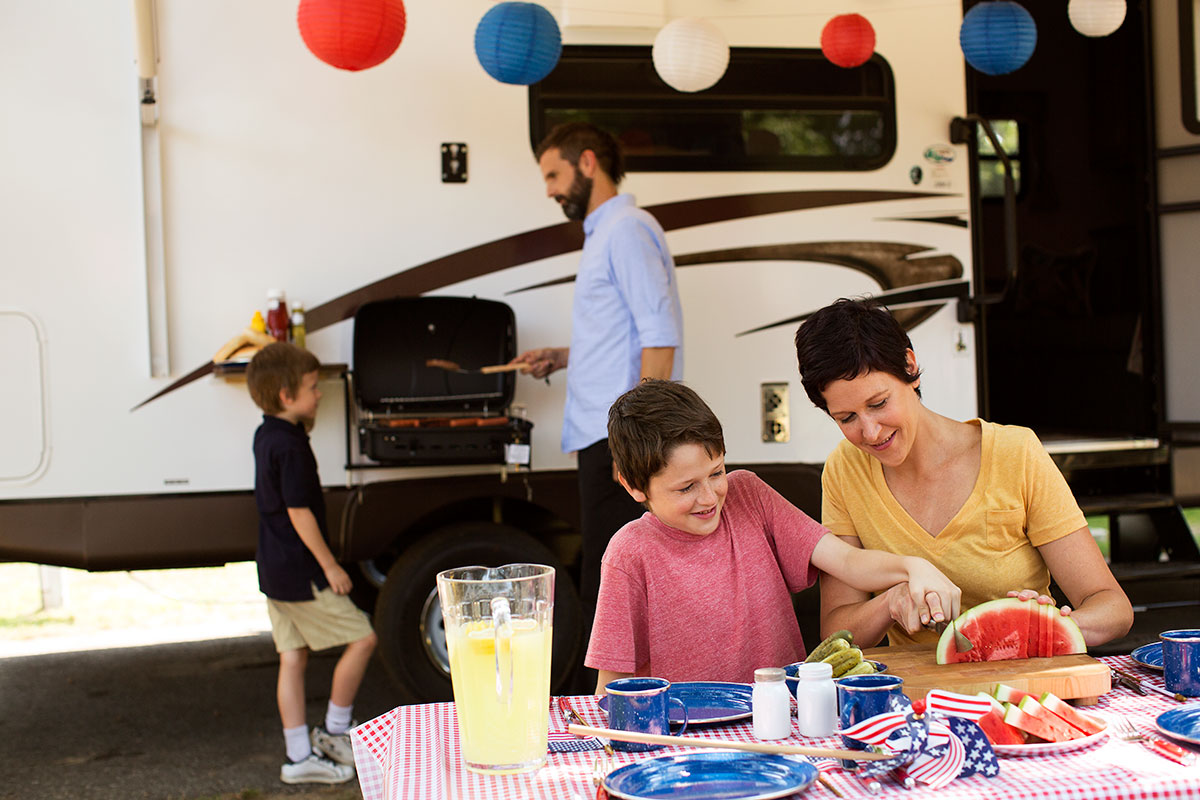There are RV owners of every age, with the highest concentration of owners in the 35-54 range. Not the over-65 crowd you were expecting? More and more mid-lifers make the investment in an RV while they’re still working and raising a family.
Having children along can bring a lot of joy to RV trips: you get to try different things, explore the world through their eyes, and do things together, which helps to create a deeper bond. Late night card games, roasting marshmallows over a campfire, hiking to the overlook, sharing memories of past trips, teaching about wildlife and safety… the list goes on.
Owning an RV is a significant lifestyle choice for any family, so it’s important for every capable member of the family to be involved in the care of the RV and getting ready for trips. In that way, the workload gets distributed across more hands, and your children will come to appreciate all that RVing has to offer. In fact, 95 percent of people who camped as children said it had a positive impact on their adult lives, helping them develop an appreciation for the outdoors and for different people and places. Here are some ideas of things your kids can do, by age.
Age 0-2: Okay, we know that these little ones can’t help pack up an RV or sweep a broom, but since they need so much supervision, which can take away the adult from other tasks, we had to include them on the list. Adults, before departing for your trip, try to get as much as you can ready and packed when babies and toddlers are asleep for a nap or for the night. These young members of the family are highly portable by backpack or front pack, so if you need to get something done before you leave, at the campsite, or in preparing for departure, strap on the pack and bring your child along. You can also set your baby or toddler in a stroller as you’re working to get ready or working around the campsite if you are able to supervise.
Age 3-5: These little tykes are enthusiastic about helping out, so give them easy jobs. Again, supervision is required, but have them help out inside an RV, a place that will contain them in case they lose interest (and they will!). One area is cooking. Ask your child to help with mixing ingredients or pouring them into the bowl. Outside, bring the young ones along on walks to find kindling for the campfire. If the RV needs a wash, give your child a sponge and let them enjoy some water play while they “work.” You’ll have more fun, too!
Age 6-9: This age is perfect for helping with packing up and unloading. Bring your checklist of items and have your child look for the items or bins while you check them off. This is also a great time to show your child everything that needs to be done to pack up and get the RV on the road; set up at the campground, park, or resort; and what needs to be done as you’re packing away the campsite. Get them involved at a young age and they will know what to do when they are older – as well as grow an enthusiasm toward RV living.
Age 10-15: Children of this age can start to be handier – chopping wood or kindling for instance. They can assist in the kitchen by slicing and dicing vegetables and fruits for family meals. Again, get your kids involved with the departure and arrival checklists. Maybe even ask for them to be the right seat driver occasionally. Kids are also tech savvy, so ask for their help with coordinating the GPS as well as finding things to do around your chosen destinations. Get them involved with trip planning by asking for their input. This is also a great age in which you can make your child(ren) responsible for certain tasks, such as cleaning up cooking areas and supplies after meals, organizing the game cabinet, and keeping the floor of the RV nice and clean.
Age 16-18: If you’re confident in your child’s driving abilities, spatial awareness, and safety, then teach him or her to help with backing in the RV, attaching the RV, and pulling it. This is more likely for towables than motorhomes. Begin simply, out of the driver’s seat. You may need to double check with your insurance provider, however, to make sure your child is able to do this without requiring any additional fees or provisions.
Instead of a cottage or a hunting cabin, many parents decide to purchase an RV – and be able to visit anywhere they want from the comfort of their rig or trailer. This makes the possibilities – as well as the family fun –limitless!

